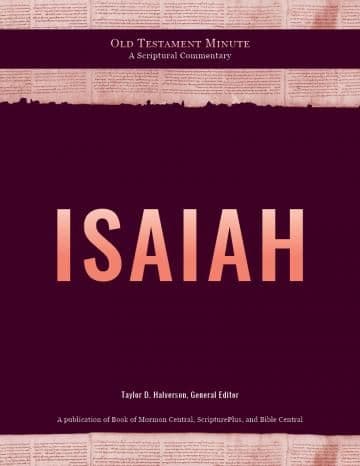Book
66 Chapters

Isaiah 63
The setting for this section, which consists of a dialogue between the Lord and an unnamed individual (or, individuals), is the Second Coming. An unnamed individual asks questions and the Lord responds; the individual questions again, and the Lord provides a longer reply. Doctrine and Covenants 133:46–53 quotes portions of Isaiah 63:1–9 but with some explanatory changes.
Edom/Bozrah. The ancient country Edom, also called Idumea, symbolizes “the world” (Doctrine and Covenants 1:36); Bozrah, Edom’s capital city, also represents worldliness. glorious in His apparel. The resurrected Jesus Christ and His clothing are glorious. traveling in the greatness of His strength. Like a man of war, the Lord travels with great power.
apparel red. Jesus Christ will wear red clothing at His Second Coming (see also Revelation 19:13; Doctrine and Covenants 133:48). The red symbolism is emphasized in this section with the words and phrases “Edom” (Hebrew ’adom, meaning “red”), “dyed-red garments,” “apparel red,” “garments like him . . . treads in the wine press,” and “lifeblood spattered on My garments.”
I have trodden the wine press alone. When Jesus Christ presents the kingdom to His Father, He will say these words: “I . . . have trodden the wine-press alone, even the wine-press of the fierceness of the wrath of Almighty God” (Doctrine and Covenants 76:107; 88:106). I did tread upon them in My anger. At His first coming, Christ symbolically trod the winepress in offering the Atonement in the Garden of Gethsemane; but at the Second Coming, He will tread the wicked in vengeance, even as one treads on the grapes in a winepress to force out the juice. Both acts stain His garments with blood (34:6; Joel 3:13; Lamentations 1:15).
day of vengeance/year of My redemption. Because of His great love for us, the Lord’s vengeance is short-lived (one day) compared to His redemption (one year).
I made them drunk in My wrath. Those who do not accept Jesus’s Atonement will have to drink the cup of His wrath (51:17).
This beautiful psalm emphasizes Jehovah’s great love for His people, as evidenced by these expressions: “the abundance of His loving-kindnesses,” “His mercy,” “His love,” “His pity,” He is the “Savior,” “He redeemed them,” “He lifted them up” and “carried them all the days of old,” He gave them “His Holy Spirit,” and “He led them by the right hand of Moses with His glorious arm.” Like all sections in the book of Isaiah, this entire section focuses on the Lord—“Lord” appears four times, “Savior” once, and the pronouns “He” and “His” (referring to the Lord) a total of sixteen times.
Surely they are My people. The Lord testifies that Israel is, indeed, His people. The Lord’s testimony is followed by Isaiah’s witness, “He became their Savior!”
angel of His presence saved them. The angel is none other than Jehovah Himself (Exodus 33:12–15; Doctrine and Covenants 133:52–53).
His Holy Spirit. Verse 11 also refers to “His Holy Spirit” and verse 14 states that the “Spirit of the Lord gave them rest.”
Who led them by the right hand of Moses with His glorious arm. “Moses stretched out his hand over the sea, and the Lord caused the sea to go back with a strong east wind all that night, and made the sea dry land, and the waters were divided” (Exodus 14:21). Although Moses’s right hand was stretched out in this sacred gesture, it was God’s power that divided the sea with His “glorious arm.” to make for Himself an everlasting name. The Lord’s marvelous and miraculous acts make “an everlasting name” for Him; the concluding words of this section similarly state, “You led Your people to make a glorious name for Yourself.”
Like a horse in the wilderness, that they did not stumble. A horse in the wilderness is steady of foot. Similarly, the Lord helped Israel to flee Egypt with steadiness, without faltering.
The speaker of these verses is difficult to determine. Some have called these words, “Isaiah’s intercessory prayer,” but others maintain that God’s covenant people are collectively praying (see the Latter-day Saint Bible chapter heading). Whoever is praying directly addresses God with the fourfold “O Lord.” In fact, the entire prayer centers on the Lord, who is called “our Father” (three times) and “our Redeemer.” Additional evidence that the prayer focuses on the Lord is that the pronoun “Your” (referring to the Lord) appears 21 times: “Your might,” “Your compassion,” “Your name,” “Your ways,” “Your holy people,” and more. Doctrine and Covenants 133:40–45 cites and paraphrases Isaiah 64:1–5.
The speaker poses six rhetorical questions in this section (63:15, 17; 64:5, 12); questioning is a significant way to teach gospel truths. Your holy and glorious habitation. A reference to God’s Temple in Heaven. The earthly temple is God’s dwelling place on earth; the heavenly temple is His habitation in heaven (Revelation 7:15; 16:17). Where are Your zeal. Zeal refers to God’s passion. yearning of Your inner parts. By “inner parts,” the speaker is asking the Lord, Where are Your heart and bowels of mercy?
You are our Father/Abraham/Israel. Although Abraham and Israel were Israel’s earthly ancestors, they are now dead. God is our Eternal Father. The speaker twice repeats “You are our Father” for emphasis. our Redeemer. The Lord pays the price to ransom us from sin and death. The Lord is called “Redeemer” a total of 13 times in Isaiah’s book.
Your Temple. The temple of Solomon.
Book
66 Chapters
Items in the BMC Archive are made publicly available for non-commercial, private use. Inclusion within the BMC Archive does not imply endorsement. Items do not represent the official views of The Church of Jesus Christ of Latter-day Saints or of Book of Mormon Central.